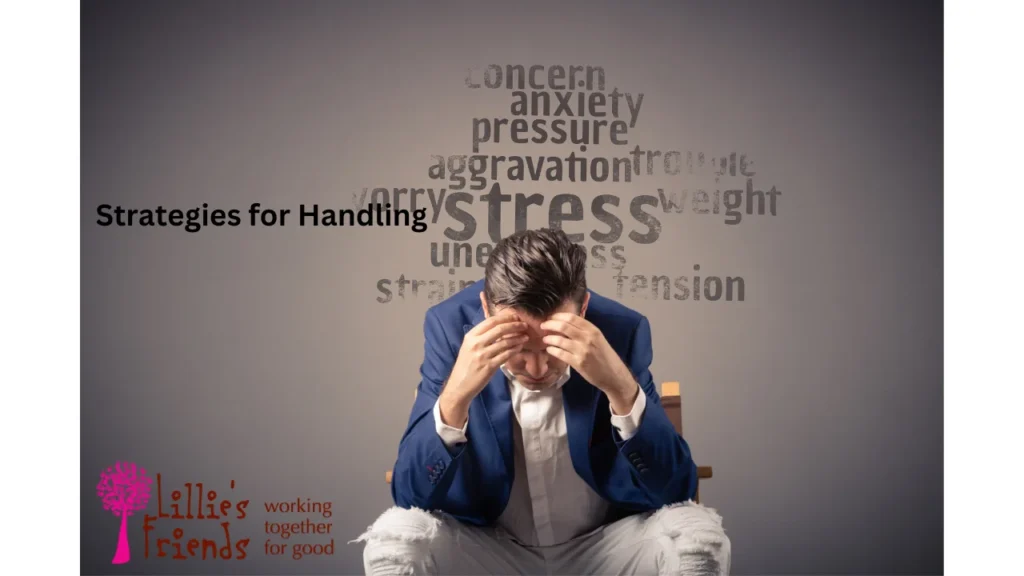Everybody sometimes has to cope with stress. It may be quite stressful to juggle job, family, and other obligations. Even more severe stresses may sometimes arise, such as losing a loved one, having money problems, or receiving a chronic medical diagnosis.
In general, stress is not always bad. It may sometimes serve as motivation to complete tasks. Therefore, experiencing worry and mental exhaustion temporarily may be expected. However, you should get professional treatment right away if you experience anxiety and stress for more than a few weeks or if the tension becomes a hindrance to your ability to perform.
Stress and other mental diseases have shown significant improvement with the use of psychological treatment, drugs, and other coping mechanisms. Furthermore, you may use self-help methods to increase the effectiveness of your therapy. Here is a review of them.
Strategies for Handling Stress

You may develop techniques for stress management even when some difficulties and anxieties are unavoidable. These techniques support you in maintaining mental wellness despite the events of your everyday life. Among them are:
Three Lifestyle Changes to Lower Stress
When it comes to leading a generally healthy lifestyle, certain stress management techniques are easy to put into practice. Thus, you may use the following advice to reduce stress to some degree:
Engaging in physical exercise, such as swimming, cycling, or aerobics, may effectively relieve stress. These stress-reduction techniques lead to better sleep, which strengthens one’s capacity to control tension. Exercisers often get deeper, slower-wave sleep at night than non-exercisers. Sleeping during the slow wave period is essential for revitalizing the body and mind and improving your ability to manage stress. But keep in mind that engaging in strenuous exercise just before bed might disrupt your sleep pattern.
In addition to improving sleep, physical activity lifts the spirits. Your body releases compounds during exercise, including endorphins and endocannabinoids. These substances, sometimes known as the “feel-good” hormones, aid in inhibiting and reducing pain and enhancing sleep. It’s endocannabinoids that provide the euphoric sensation that follows long runs. If you feel well physically, your mind will also be at rest. People who exercise have a tendency to be happier and less nervous than people who don’t exercise as a coping mechanism.
If your schedule prevents you from participating in popular fitness regimens like running and aerobics, consider finding an alternative form of exercise, such walking on lunch break, utilizing the stairs rather than the elevator, or even cleaning your vehicle.
A lot of individuals simply consider the health advantages of eating well. But the advantages go beyond keeping a healthy body mass index and include mental well-being.
A balanced diet has major benefits, ranging from lowering stress levels to elevating mood. Eating well increases immunity and decreases blood pressure, which improves your capacity to handle stressful situations.
When under stress, junk food may seem enticing, but if you want to prevail in the fight for your mental health, restrict it. Consume nutritious grains, lean meats, and vitamins as an alternative. In order to combat stress, several nutrients are crucial, including magnesium, vitamin C, and omega-3 fatty acids. Make sure your diet contains enough of these nutrients.
Sleep difficulties, such as trouble falling or staying asleep, are often brought on by stress. However, sleep deprivation may exacerbate worry and stress. Essentially, you have to break free from this vicious loop. You may reduce stress and enjoy pleasant evenings by implementing healthy sleep habits.
Regular exercise, avoiding stimulants like coffee before bed, creating a sleep routine, and creating a pleasant sleeping environment are all examples of good sleep hygiene habits. Good sleep requires a dark, quiet environment and a high-quality mattress.
Techniques for Relaxation
Inhaling deeply
When you’re under stress, shut your eyes, inhale deeply through your nose, and then release the breath. Since it induces a deep sleep that modifies your body’s response to stress, this kind of breathing exercise is among the greatest strategies to manage stress. Generally speaking, deep breathing relaxes the body and increases oxygen flow to the brain.
Meditating
Meditation can help you if you are suffering from stress, chronic pain, or a mood problem. When you’re stressed, locate a quiet spot, get into a comfortable position, and concentrate on just one thing at a time while allowing your thoughts to flow freely without passing judgment.
Yoga
The advantages of yoga differ greatly. To lower stress and maintain your fitness, concentrate on stretching, deep breathing, and gradual movement. Try out a few different styles of yoga to see which is best for your physical and mental needs.
Biofeedback in Stress Reduction
You may take charge of your body’s response to stress and learn how to manage stress and anxiety with the assistance of a biofeedback therapist. Installing a sensor that recognizes variations in blood pressure, pulse rate, or muscular tension during stressful situations is part of the treatment. The biofeedback psychologist will work with you to create strategies for maintaining signals within the normal range under all conditions.
To sum up
There are stressful situations in our daily lives. However, stress may be incapacitating if it impairs your ability to perform in social, cognitive, or physical domains. You may use biofeedback treatment, lifestyle changes, and relaxation methods as preventative measures against stress aggravation.


0 Comments